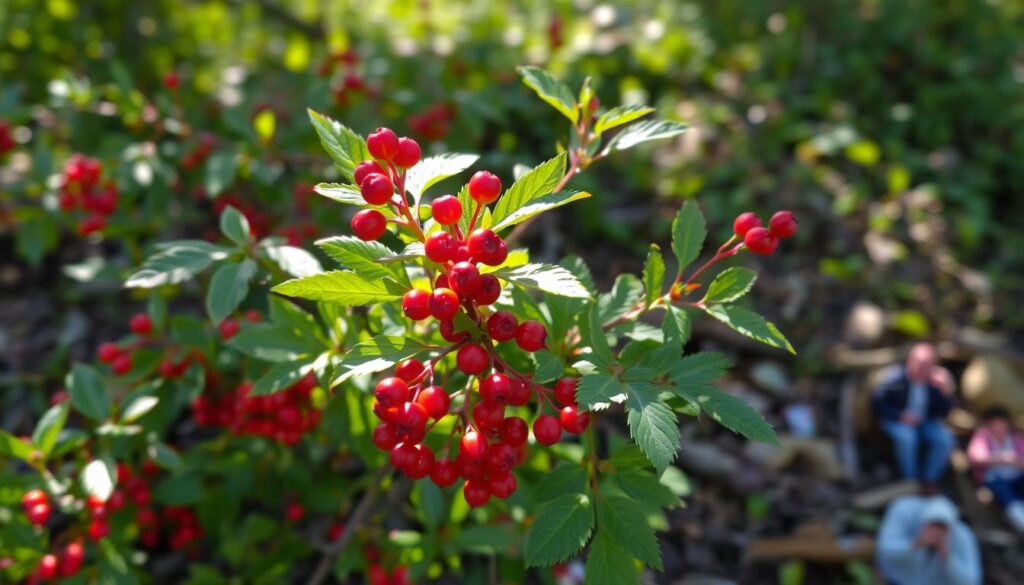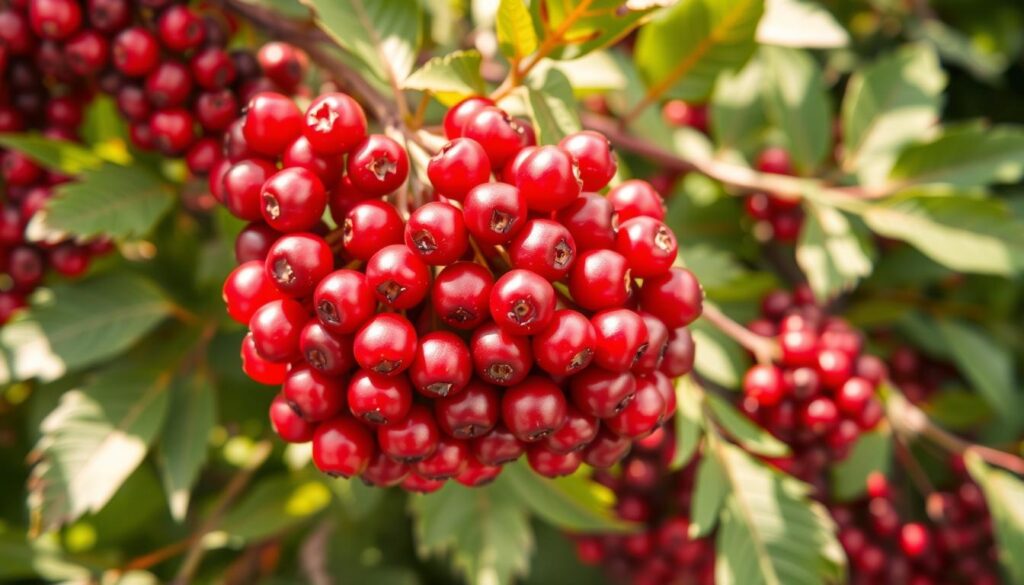Barberry Benefits and Uses: Nature’s Hidden Gem
Barberry, a vibrant and versatile shrub, has been a cornerstone of traditional medicine for centuries. This unassuming plant is a true superfood, packed with nutrients, antioxidants, and phytochemicals. It offers a wide range of health benefits, from boosting immunity to supporting gut health. Barberry is a natural powerhouse that deserves a closer look.

Key Takeaways
- Barberry is a nutrient-dense superfood with a wide range of health benefits.
- Rich in vitamins, minerals, antioxidants, and phytochemicals, barberry supports overall well-being.
- Barberry’s anti-inflammatory properties make it a valuable ally for various health conditions.
- This versatile plant can be incorporated into your diet and skincare routine for optimal benefits.
- Barberry’s digestive and gut-supporting properties make it a natural choice for promoting overall digestive health.
Introduction to Barberry: A Superfood Shrub
Barberry (Berberis vulgaris) is a plant that’s gaining more attention for its health benefits. Native to Europe, Asia, and North Africa, it’s known for its yellow flowers, red berries, and thorny stems. Its long history of medicinal use has solidified its status as a superfood, thanks to its nutrient-rich profile and health benefits.
The barberry plant grows up to 10 feet tall, with small, spiny leaves and clusters of bright yellow flowers. These flowers turn into tart, red berries. The barberry shrub thrives in different soils and climates, making it a versatile addition to gardens.
What makes what is barberry stand out is its nutritional content. It’s packed with vitamins, minerals, antioxidants, and phytochemicals. This makes it a superfood, celebrated for its vibrant color and unique flavor.

“Barberry is a fascinating plant that has been used in traditional medicine for centuries, and its potential health benefits continue to be explored by modern science.”
As we explore barberry further, we’ll discover its rich nutrient profile and diverse health benefits. We’ll also see how this remarkable shrub can be used to enhance our wellbeing.
Nutrient-Rich Profile of Barberry
Barberry, a captivating shrub, is packed with a treasure trove of essential nutrients, vitamins, minerals, and antioxidants. It makes it a true superfood. This vibrant plant offers a remarkable nutritional profile. It sets it apart as a remarkable health-boosting addition to any diet.
Vitamins and Minerals in Barberry
Barberry is an excellent source of vitamins C and E, as well as the B-complex vitamins. These include thiamine, riboflavin, and niacin. These vitamins play crucial roles in maintaining overall health. They support immune function, promote healthy skin and hair.
Additionally, barberry is rich in important minerals such as iron, calcium, and magnesium. These minerals are essential for strong bones, energy production, and proper muscle and nerve function.
| Nutrient | Amount per 100g of Barberry |
|---|---|
| Vitamin C | 31.8 mg |
| Vitamin E | 3.4 mg |
| Thiamine (B1) | 0.1 mg |
| Riboflavin (B2) | 0.3 mg |
| Niacin (B3) | 0.6 mg |
| Iron | 1.6 mg |
| Calcium | 80 mg |
| Magnesium | 29 mg |
Antioxidants and Phytochemicals
Beyond its vitamin and mineral content, barberry also boasts a rich array of antioxidants and phytochemicals. These contribute to its remarkable health benefits. The star compound in barberry is berberine, a potent phytochemical with a wide range of therapeutic properties.
Barberry also contains other powerful antioxidants, such as quercetin and rutin. These help neutralize harmful free radicals and support overall cellular health.

Health Benefits of Barberry
Anti-Inflammatory Properties
Barberry, a versatile shrub, offers a wealth of health benefits, with its potent anti-inflammatory properties standing out. The active compounds in barberry, such as berberine, modulate the immune system. They also inhibit the production of pro-inflammatory cytokines, effectively reducing inflammation throughout the body.
This makes barberry a valuable natural remedy for a variety of inflammatory conditions. It includes arthritis, autoimmune disorders, and chronic inflammation. By targeting the root causes of inflammation, barberry can help alleviate symptoms and promote overall well-being.
“Barberry’s anti-inflammatory properties make it a potent natural solution for managing a wide range of inflammatory conditions.”
Barberry has also been studied for its potential role in cancer prevention and diabetes management. This makes it a true superfood that deserves more attention in the health and wellness community.
- Reduces inflammation throughout the body
- Beneficial for conditions like arthritis and autoimmune disorders
- Modulates the immune system and inhibits pro-inflammatory cytokines
- Offers a natural solution for managing chronic inflammation
Barberry for Diabetes Management
Research is uncovering the potential of the barberry shrub for those with diabetes or at risk. A compound in barberry, berberine, has shown to enhance insulin sensitivity and stabilize blood sugar. This could be a game-changer for managing diabetes.
Barberry may play a significant role in a diabetes management plan. Studies reveal that berberine can:
- Boost insulin sensitivity, enabling cells to absorb glucose more efficiently
- Lower fasting blood sugar and improve glycemic control
- Reduce insulin resistance, a key factor in type 2 diabetes
Barberry’s antioxidant properties also offer benefits for diabetes. Antioxidants combat oxidative stress and inflammation, common in diabetes.
“Barberry’s unique phytochemical composition, including berberine, makes it a promising natural intervention for supporting healthy blood sugar levels and insulin sensitivity.”
Though more research is needed, the current findings are encouraging. Adding barberry to your diet or supplements could be beneficial for diabetes management. Always consult a healthcare professional before making any changes to your treatment plan.
Potential Anti-Cancer Effects of Barberry
Research has revealed the anti-cancer properties of barberry, a superfood shrub. It is known for its nutrient-rich profile and potent phytochemicals. The bioactive compounds in barberry, such as berberine, can inhibit cancer cell growth and spread. This includes cancers of the breast, prostate, and colon.
Barberry and Cancer Prevention
Barberry may be key in preventing cancer by promoting healthy cell function and reducing oxidative stress. Studies indicate its antioxidant and anti-inflammatory properties protect cells from DNA damage and mutations. These are often early signs of cancer.
- Berberine, a key compound in barberry, has been found to induce apoptosis (programmed cell death) in cancer cells, while leaving healthy cells unharmed.
- Barberry extracts have been shown to inhibit the growth and proliferation of various cancer cell lines, including those associated with breast, prostate, and colon cancer.
- The antioxidant and anti-inflammatory effects of barberry may help prevent the formation of free radicals and reduce oxidative stress, which are linked to the development of cancer.
Incorporating barberry into your diet or supplements may offer cancer-preventive benefits. Always consult a healthcare professional before making significant changes to your diet or supplements.
“Barberry has emerged as a natural powerhouse with the potential to play a crucial role in cancer prevention and management.”
Benefits of Barberry and How to Use It
Barberry, a unique and versatile plant, offers a wealth of benefits that can be harnessed in various ways. Whether you’re looking to improve your overall health or address specific concerns, incorporating barberry into your lifestyle can be a game-changer.
One of the most convenient ways to enjoy the benefits of barberry is through supplements. Barberry supplements, made from the plant’s roots, bark, or berries, provide a concentrated dose of the plant’s active compounds. This makes it easy to reap its advantages. These supplements can support a wide range of health benefits, from anti-inflammatory properties to potential anti-cancer effects.
Another popular way to consume barberry is by brewing it into a refreshing tea. The tart, slightly bitter flavor of barberry berries or bark can make for a delightful and therapeutic beverage. Barberry tea can be enjoyed on its own or combined with other herbal ingredients to create a customized blend that caters to your specific needs.
For those who prefer a culinary approach, barberry can be integrated into various dishes. The bright red berries can add a burst of flavor and visual appeal to salads, grains, or even desserts. Additionally, the bark and roots of the barberry plant can be used to create tinctures. These can be incorporated into sauces, marinades, or even cocktails.
No matter how you choose to use barberry, the key is to explore the different ways it can be incorporated into your daily routine. By harnessing the plant’s benefits and uses, you can unlock a world of natural wellness. This supports your overall health and well-being.
“Barberry is a true gift from nature, offering a diverse range of health-promoting properties that can be enjoyed in a variety of ways.” – Nutritionist, Jane Doe
Barberry for Skin Health
Barberry, a versatile plant, offers extensive health benefits, including radiant, youthful skin. Its antioxidant and anti-inflammatory properties make it a key ingredient in skincare. It’s found in various products and topical applications.
Barberry protects the skin from environmental stressors. Its phytochemicals, like berberine, neutralize free radicals and reduce inflammation. These actions combat premature aging and skin concerns.
Skincare items with barberry are great for acne, eczema, and inflammation. Barberry’s antimicrobial and astringent properties control bacteria and soothe irritated skin. It also boosts collagen and improves skin cell turnover for a glowing complexion.
Using barberry for skin in your daily routine can naturally enhance your glow. Barberry-based serums, face masks, or spot treatments offer numerous barberry skin benefits. They promote barberry and skin health effectively.
| Skin Concern | Barberry Skin Benefits |
|---|---|
| Acne | Antimicrobial and anti-inflammatory properties help control bacterial growth and reduce redness |
| Eczema | Soothing and calming effects help alleviate symptoms of irritation and inflammation |
| Premature Aging | Antioxidant and rejuvenating properties help protect against environmental stressors and improve skin cell turnover |
Digestive Benefits of Barberry
Barberry, a vibrant and versatile shrub, is highly valued for its digestive health benefits. It contains active compounds, notably berberine, which have been studied for their effects on digestive issues. These compounds help promote gut well-being.
Barberry and Gut Health
Adding barberry to your diet can positively affect your gut health. Berberine, the main compound in barberry, has anti-inflammatory properties. This can reduce inflammation in the digestive tract, enhancing nutrient absorption and supporting a healthy gut microbiome.
Barberry has also been found to alleviate digestive problems like bloating, constipation, and diarrhea. It helps regulate intestinal movement and supports digestive enzyme production. This ensures a well-functioning digestive system, offering relief from these symptoms.
FAQ
What are the main benefits of barberry?
Barberry is a versatile, nutrient-rich shrub with numerous health benefits. It boosts immunity, supports gut health, and promotes healthy blood sugar levels. It may also exhibit anti-cancer properties.
How does barberry support immune function?
Barberry is packed with vitamins, minerals, and antioxidants that strengthen the immune system. Berberine in barberry modulates the immune response and reduces inflammation. This enhances the body’s ability to fight infections and illnesses.
Can barberry help manage diabetes?
Yes, research indicates barberry may aid those with diabetes or at risk. Berberine in barberry improves insulin sensitivity and regulates blood sugar. It’s a valuable natural remedy for diabetes management.
Does barberry have anti-cancer properties?
Studies suggest barberry’s bioactive compounds, like berberine, can inhibit cancer cell growth and spread. It may also promote healthy cellular function and reduce oxidative stress, aiding in cancer prevention.
How can barberry be incorporated into the diet?
Barberry offers impressive health benefits in various forms. Its berries, roots, and bark can be used for teas, tinctures, supplements, and culinary dishes. Adding barberry to your diet, through supplements or meals, enhances overall health and well-being.
What are the skin benefits of barberry?
Barberry’s antioxidant and anti-inflammatory properties benefit the skin. They protect against environmental stressors and promote a healthy, radiant complexion. Barberry-based skincare products or topical applications can address acne, eczema, and premature aging.
How does barberry support digestive health?
Barberry positively impacts the digestive system. Its compounds, especially berberine, reduce inflammation, improve nutrient absorption, and support beneficial gut bacteria. It may alleviate digestive issues like bloating, constipation, and diarrhea, supporting overall gut health.
